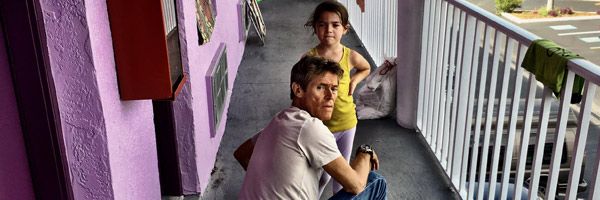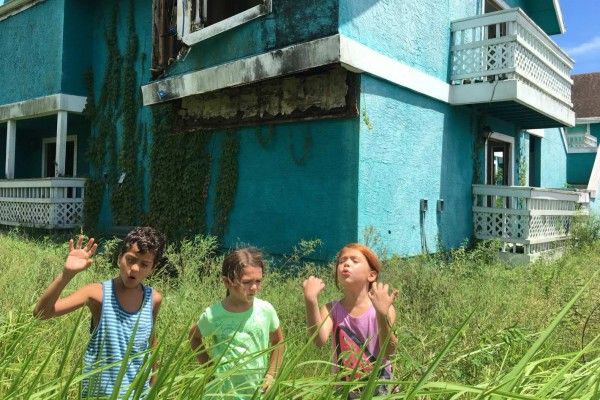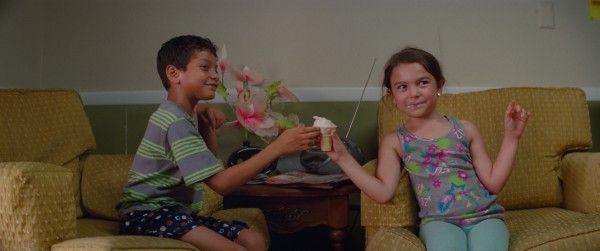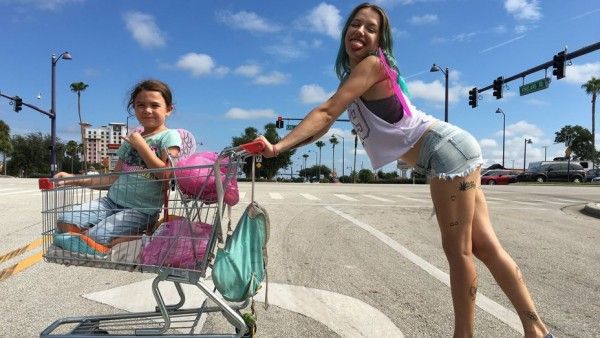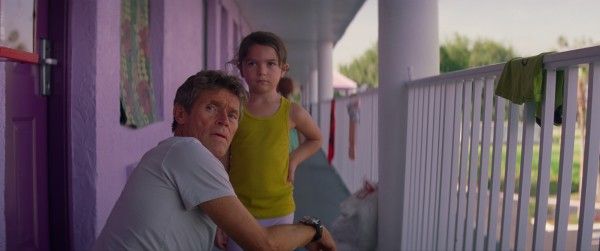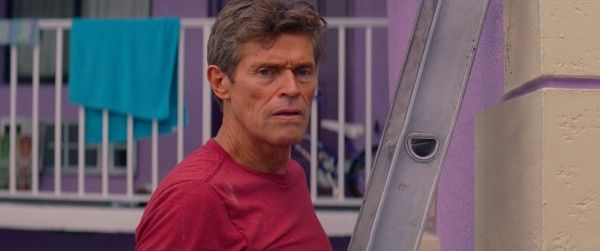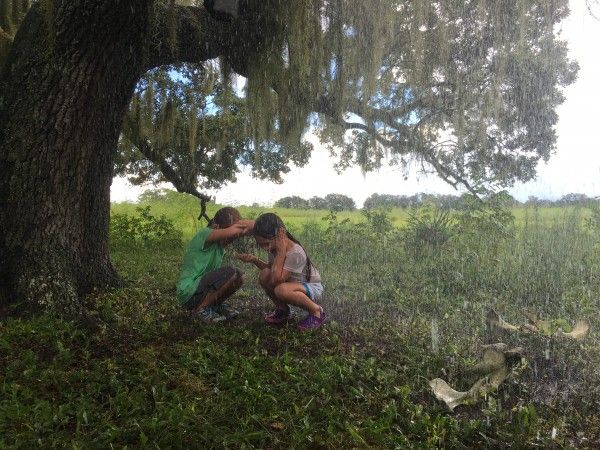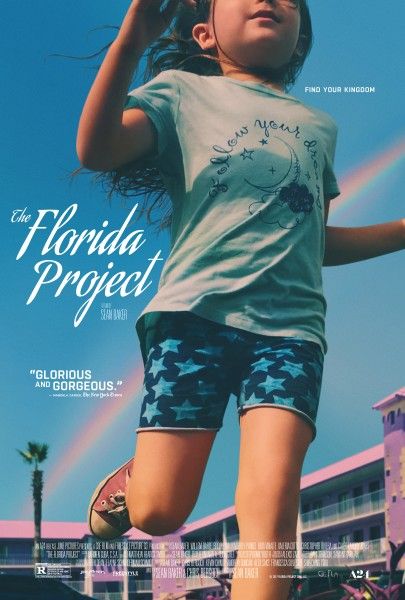The Florida Project is Sean Baker‘s follow-up to Tangerine. And it's going to be a lot of folks favorite films of 2017. It concerns a cheap motel near Disneyworld and the families who live there, scraping by week to week. Starring a bunch of fresh-faced newbies to acting, the movie, Willem Dafoe is the heart of the film, something he’s not frequently been used for as of late, but something that the Spider-Man actor is insanely good at here. In fact, Dafoe could very much be toward the front of the Best Supporting Actor Oscar pack this year for his performance in Florida and The Florida Project could even appear as a Best Picture candidate. (Read Gregory Ellwood’s rave review from its premiere at the Cannes Film Festival, here; and Adam Chitwood’s Oscar tea leave readings, here).
In Project Dafoe plays Bobby, the motel manager of the Magic Castle. It’s a rundown motel but it’s exterior isn’t as rundown as many of the inhabitants are as they scrape together money for rent via waitressing, scamming Disneyworld tourists, and hooking. Bobby is more than a caretaker of the property he’s a caretaker of these forgotten souls; particularly a young mother (Bria Vinaite) and her wild daughter (Brooklynn Prince). Along with care-taking, this includes some tough love, too.
Recently, I got the chance to sit down and talk with Baker about what drew him to make this film, how he got away with casting unknown actors, some similarities he shares with the Safdie Brothers (Good Time), and the prefect father-son casting of Dafoe and Caleb Landry Jones. You can read the whole interview below and my interview with Dafoe, here.
Collider: This film was obviously very location based. What was the genesis of choosing this specific area?
SEAN BAKER: It was because this is the area where I was made aware of this type of fringe family housing situation. You know, the natural habitat. This is a national problem, however, Chris Bergoch, my co-screenwriter, brought it to my attention from [the Disneyworld area] first and it wasn't until I did research that I realized this is a nationwide thing. But, we still decided to focus on it in that area because of the juxtaposition between children growing up in motels and what we consider the happiest place on earth right next door. We were thinking that the message we would be giving the audience is if it could happen here it could happen anywhere. So that's why we focused on it there. And from a director’s standpoint, it gave me so much to work with visually. Route 192 is its own thing and you can’t find that anywhere else. The colors and shapes of the buildings, the way that all the small businesses in a way feed off of the parks and sort of rip off the themes of Disney—you’re not going to find that anywhere else. It just gave me a lot of eye candy to work with so it made my job easier. But also, it was about the message we were trying to get out there. I think that people would be taken aback by it the same way I was taken aback by it and getting people's attention became a big driving force.
When you were growing up, were you big on Disney movies? Or the theme parks?
BAKER: Actually no, I’m a rarity. My co-screenwriter though,100%
Is he from Florida?
BAKER: No he’s from Jersey, but he took family trips down there all the time and eventually his sister worked for the cooperation and now his mother lives down in Lincoln City in Orlando area. So he had a strong connection and continues to have a strong connection with it. I think that’s probably why it got under his radar. He probably read those news articles that focused on the situation in and along Route 192.
Interesting. Around that age that Brooklynn would be in this, my family left Florida when I was 6 —
BAKER: Oh, what city?
It was a really small town, it was called Lake City and we moved to Idaho very far away. But my parents were outdoorsy, they did not want to stand in line for rides. Disneyworld was not an option but we went to Busch Gardens.
BAKER: [Laughs] Ohhh, of course, of course. Well I grew up in Jersey, too, so it was like Six Flags, you know.
So the hotel that you used—it was still kind of mildly or fully operational—did you choose it because you specifically liked it visually or you ended up having a good relationship with the manager who allowed you to use it?
BAKER: There were several motels that we were thinking about but I just kept going back to this one saying how can I not use this location? Number one: the colors, the fact that it’s a castle. It also provided the room. It was actually one of the larger motels that we looked at. It gave us a lot of room to play with. And we knew we wouldn't be able to own an entire motel, we couldn't shut it down and own it, so we would have to play nicely and work with the owner about how to not to interfere with their business or annoy their real customers there. And it was something I was used to from my other films. I don’t know how many of my movies you've seen—
I've seen your previous three. I loved Starlet—.
BAKER: Oh, thank you very much. Cool that’s nice to hear. I always like when people like some of the old ones. Yeah so for example, (in Starlet) we shot in the convention hall. That event was an active thing going on. In Tangerine, you have Donut Time in which we never shut that down. So I kind of got used to [shooting in operational locations] and it was just something in which the owner was very nice. He understood what we were doing; he read the script and he was okay with us depicting The Magic Castle that way. At the end, of course, we give them a disclaimer, that this doesn't exactly represent a real establishment. But to tell you the truth, quiet honestly, [the hotel] has been through it’s hard times and i think it was slightly coming out of it when we shot there. We were being forced by the local government—because there was a beautification process going on on route 192—so were forced to take out older, dilapidated signs and put in new ones. So they were doing their best to try to bring back to glory days in a very transitional time that we shot there.
It’s nice to have the full building because you get to have some nice Rear Window-type shots where Dafoe’s going across the entire floor and everyone’s opening doors, that kind of old movie set type of feel except it was actually real.
BAKER: Yeah and we had full access—except for the rooms that were actually booked.
So were Moonee's scenes strictly scripted or were they kind of describing to her a feeling of the scene and having her kind of create that as opposed to sticking to dialogue?
BAKER: There were a few scenes, and I'll tell you which ones, that were more improv. But for the most part, I have to say, we stuck pretty close to the script, we had limited hours, and Brooklynn is amazing at just learning lines. So she would come to set knowing the scenes and then sometimes if I had time I would let them deviate or I would encourage some improvisation. There were sometimes that were almost fully improv, but obviously she knew what she had to say to sell the perfume. That was literally like we were putting them in a candid camera situation. So I couldn't even—I couldn't tell her what to expect because I didn't know what—
You were actually kind of soliciting then so it was kind of like Scarlett Johansson picking up men in Under the Skin...
BAKER: Yes, exactly. So going up to tourists to attempt to sell cheap perfume was entirely candid. And then of course at the end, when she’s eating at the brunch, I believe we rolled T-max, which is a full 20 minutes, which is A LOT of footage. I think we actually got through all of her scripted lines in the first minute and a half and then after that we just had time to play so we would let her improvise, we would ask her questions, we would feed her lines that we were coming up with in the moment. Like if she said for example, in the film she said, “I wish my fork was made of candy.” And then I would quickly say, “so you could eat it after you finish your meal!” and then of course they would cut my voice out, she would be smart enough not to look at me, but just to hear it and process it and be like “then, I could eat it after my meal!” It was that sort of Adam McKay-ish sort of on the set back and forth. But no, no I mean, I have to say that a lot more exposition than you actually think but it is sprinkled in there and she always had to stick to those lines. But again, I encourage improvisation and she has the skill to do it if she wants, which is crazy.
Can you talk about casting Bria? I know that she has a large Instagram presence. Were you already following her or did you find her through this process of looking for this character?
BAKER: I found her through the process. I was in one of those late night black holes where you're scrolling through everybody and I I honestly don’t remember when I first saw her—maybe I think we were looking actually for someone—I can’t remember, I wish I could. I guess somebody must've reposted one of her posts and then I saw it. At the time I was thinking about the character of Halley a lot, and we haven't cast for her yet. So we were out to some A-listers for that role, but we were also considering possibly stunt casting, like an ex musketeer in that role. But then, I kept going back to Bria’s Instagram saying “yeah, well they’re not going to be as good as her so....” But we could never cast her because my financiers won’t allow me to but then somebody finally said, “why don’t we just audition her? You proved in Tangerine that unconventional casting can work.” And I think that’s what allowed me to do it. So we flew her to Orlando. She connected with Brooklynn and it seemed to me like the energy was there. I actually believed them as mother daughter.
[Bria] was really enthusiastic about doing it, but at the same time, she was intimidated. She said, “Help me” and we said "we're gonna give you a crash course in acting for the next month." So a month leading up to the shoot, she lived down [in Florida] and she was working with my acting coach who worked with the kids and it was just all intensive. It was freakin’ awesome, was what it was. She really really got to that place we needed her to get to.
Do you feel like you needed to step up your Instagram game since you're using it for casting but your profile only has dog pics on it?
BAKER: Yes, exactly! Even yesterday I was talking to (Good Time co-director) Josh Safdie about it. He asked “what's on your Instagram?” I said “it's my dogs.” He starts laughing he’s says like, “you got to get off Twitter and just go to Instagram.” Were all getting in trouble on Twitter just get off and use your Instagram.
It's funny you bring up Josh Safdie because I was thinking actually the Safdie Brothers and you—your current stories, well actually your careers are kind of moving along similar, parallel lines—each doing this cinema verite approach to desperate urban living situations but also this fear of social services that has not been shown much in American film.
BAKER: Yeah, they did tap on that didn't they with Good Time? And also with Daddy Long Legs and [laughs] Heaven Knows What. You’re right, you’re right. Yeah, I see that. I've certainly jumped into urban poverty in a similar way. I think that when it comes to social services though, I think this is the first time I’m dealing with the subject, and this came about simply from our research there and the fact that DCS, which is the Floridian Department of Children and Family of Central Florida, has a large presence at these motels because they have to look after the kids. You know, these motels are dangerous. They’re obviously not the best environments for children growing up. So [the DCS] are present there and what was interesting is that some of the kids who actually lived at the motels, when they saw our actors show up, they were like “are those real DCS?” And I said, “no, it’s ok they’re just our actors, they just look like DCS.” Many of the stories that we had researched there were families having to deal with that DCS dropins. And when I used the threat of it, I didn't want to tip the hat who might call, because I don't want that to reflect bad on that person and just present it.
As far as everything else with the Safdies go, I think it’s just really we are influenced by the same cinema—a lot of 70s cinema. I think we’re directly influenced by a lot of the same directors.
A little throw line through your filmography as well is humanizing those that were involved in sex industry.
BAKER: Yeah, yeah, the last three films of mine have had to do with sex work.
Why do you go back to that well?
BAKER: [sighs] You know, I’m personally intrigued by the underground economy, especially when it comes to sex work, being the fact that it is the most obviously intimate of all professions. And also, I do agree—this might be divisive here, sorry—I do agree with Amnesty International stance on the fact that if you decriminalize sex work, you’re helping sex workers, you’re helping real people. People don’t see that. So I don't want to hit the audience over the head with it but I do want to put that out there. I do want to show how, I don’t know if it actually applies to Halley’s story, but as a general theme, I think showing, for me, that the decriminalization of sex work is a positive thing. It removes the stigma and that’s the most important thing. Removing the stigma is the most important through line in my work; removing the stigma from hopelessness, removing the stigma from sex work, what my movies do is put a human face and helps people perceive these stigmatized professions and communities in a much different way. I think that’s the ultimate goal with these films.
Yeah and I love that you're introducing that fact for most of these characters way into the narrative and not from the beginning because Hollywood cinema has always started with the street-walking as opposed to meeting the person and discovering later.
BAKER: There was actually a wonderful documentary that you should check out. It had a tremendous influence on me for the last three films. Its called The Great Happiness Space: Tales of an Osaka Love Thief. And it’s about one of those clubs in Osaka—they have them all over in Japan and Korea actually—and just check it out, you'll see some major influence in my works.
In Tangerine and The Florida Project, there’s this kind of swirling chaos and desperation in play, but a distinct difference in the story is that Dafoe, as Bobby, is kind of like this anchor that tries to calm all that down and slow things down. When you were writing the movie with your co-writer were you thinking of him as an anchor or did he kind of become an anchor through shooting?
SEAN BAKER: No no, we always actually saw this character, he sort of enters by grounding the situation because basically that’s become his job; that’s the job of the manager at these motels with live-in residents. They are trying to—I'm trying not to use the word "chaos"—but they are trying to control the chaos. The managers that we met that actually helped inspire the Bobby character; sometimes they were dealing with quite strong personalities. And a lot of chaos is going on in the motels. Everything from just running the business on a daily basis, to perhaps having to interject domestic abuse problems, junior partying, noise complaints, etc, etc… So there was always somebody who was trying to control the chaos, and that’s what I think Willem pretty much understood that going in having interviewed some of the managers.
I don’t know if i told you this but he came in a week early before shooting and actually spent time with some of the managers and absorbed them and I think he got that grounding quality from them. So yes, that was very much a part of it.
Willem is great in this film. I’ve always really liked him. I could remember the first time I had ever seen him in a movie with this wild smile in Platoon, but for younger audiences, Dafoe’s most iconic performances that have kind of become cultish are often kind of weird and creepy and I think they might be surprised by his warmth and humanity that’s on here. What qualities does Dafoe have that made you think of him for Bobby?
BAKER: Well, you’re right about the younger audiences because it’s very funny the way that Christopher Rivera—who played Scooty—was always excited to go to work because he was going to be able to play opposite the Green Goblin. For me, I remember being in the movie theater when I was in high school watching Platoon and then I got to see him in Mississippi Burning. but then afterward I started to see the change in the way he was being cast— well, lemme backtrack I guess my first introduction was actually before To Live and Die In L.A. and he was already that evil character in that one—but I saw the range over the years, you know, I saw Light Sleeper, I saw so much range over the years and I actually got to know him from living in New York, so I always saw this different side than what he started to get cast. I knew The Wooster Group and I understood that he was a completely transformative artist. And so, to tell you the truth, I personally, never think of him as the villain or as the bad guy, or the crazy guy. His entire career has a lot of an amazing range and a transformative ability. So, I just knew him as somebody who could pull this off and you know, you strip away pre-conceived notions. Caleb Landry Jones, is also starting to be recognized for these very very eccentric characters, who are big and out of control but I also know them as regular people and they could easily strip that away and play the everyman.
Yeah, casting him even outside of associations that maybe Caleb Landry Jones is getting from Get Out, Three Billboards etc… It’s kind of perfect casting for him to be Dafoe's son not because of weirdness but because they both have a distinct look that I believe. I believe these two people are related.
BAKER: Yeah, that’s exactly when I saw Antiviral, Brandon Cronenberg's film, I-first off thought "wow, this kid has something that’s so special, someday he’s gonna have to play Willem Dafoe’s child because they look so similar." They really do look like they’re related. And then a few years later, when we were actually in production, we originally wrote Bobby having a brother character a brother that he was helping get by by helping with some jobs every once in awhile. But once Bobby the manager started to fully rise to the surface we decided to change Bobby’s brother character into a son. And then I was like, well, if it's that—it's gonna be Caleb. You know, and I happen to know him from the Safdie Brothers. I called them and I asked them what he’s like to work with (on Heaven Knows What) and after that it was a very simple decision at that point to cast him.
As far as you know dealing with finance and producers, when you were going in and you have Willem Dafoe and a bunch of new actors, was anyone nervous about this at all? Or was it all full trust in you or did you have to convince people that these are all the right choices?
BAKER: We didn't have to fight for it because I think June Pictures they not only have trust but they were truly based off a value in these choices as well. It did, of course, put us in a position where no matter what we’ll never make the box office that we would have made if we put in the latest, latest, latest A-list actors and filled it all up with other A-listers. But I think they believed more in our intuition in choosing the right people and also in the topic and how we didn't want to have stunt casting. Well I did consider former Mouseketeers, but once I moved away from that we actually had this discussion often that—in this case—we're trying not only to obviously entertain an audience that’s very important for us, but more so we’re trying to shed a light on a subject and hope that it really has some sort of impact.
The way that I saw this happening was it's obvious to be truly biased as fast as possible because people associate actors they know with previous roles or public personas. It was important that we remove any suspension of disbelief because the story has to kick in immediately. And I knew this could be achieved with more fresh faces and with somebody who is as transformative as Willem. I was actually quite surprised and happy that I never had to like fight, fight, fight. It was something that June Pictures was willing to roll the dice, they were willing to take the gamble. Yeah, there was probably some fear from investors; there definitely was, there still is. But at the same time, I think that we we’re seeing the larger picture the same—this isn't a vanity money grab on the opening weekend—we want the film to go far and we want the film to have a true impact on a real problem and for it to look as real as possible.
And last thing, are you currently writing anything or are you waiting for this movie to come out into the world?
BAKER: I’m waiting, I’m waiting. Chris and I have some older scripts that we’re revisiting, and that stuff. But, I think that I just want to get this film out into the world and maybe even travel with the film. I would love to really take advantage because, you know, when you make these independent films, compensation is usually travel right? So in the new year, I just want to take some time to see it full circuit and get this film out to foreign territories and then after that, I will be open to inspiration. But there’s no rush right now, no rush. I’ve had to actually yell at people to lay off because everybody's agents are coming up to me saying “what’s next, what’s next, how can we help?” And I’m like “no, I'm not reading any of your scripts. Thank you, I’m not talking about this.” Let's take a breather here, we have not been able to take a breather in literally a year and a half. Even after Cannes, June, July August all the way into Toronto all we were doing was re-mixing and delivering some small tweaks and changes to A24. Even now, we’re still delivering. We’re still delivering closed captions and all the delivery items for home entertainment. So we haven't had a breather and I think at least, you know, I would love to have a week's vacation.
Will Bria and Brooklynn be able to go on tour for the film as well?
BAKER: Oh yeah. Oh they've been already invited everywhere. I mean, they even get the invite before me. [laughs] But we’re going to be doing the big gala screening at London, Time Out, then BFI. We're doing a nice European tour. My co-screenwriter is hitting Busan, my producer is hitting Taiwan. And then next year, there are a few more territories. I’m going to Turkey with Bria. So it’s gonna be a nice run.
The Florida Project opens in limited release October 6 and will expand thereafter.

